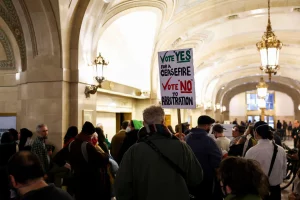Democratic candidates Supreme Court Justice Joy Cunningham and Appellate Court Judge Jesse Reyes after an Illinois Supreme Court justices candidates forum on Jan. 25, 2024, at The Union League Club of Chicago. (Vincent Alban/Chicago Tribune)
The Democratic primary contest for a seat on the Illinois Supreme Court has taken an unexpected turn as the discussion around race and representation escalates. Justice Joy Cunningham, currently holding the position after being appointed in 2022, voiced her concerns during a candidate forum, accusing her opponent, state Appellate Judge Jesse Reyes, of injecting race into the campaign.
Speaking at the forum hosted by the Union League Club of Chicago and the Chicago Bar Association, Cunningham emphasized the importance of focusing on credentials and experience rather than racial dynamics. “While I think it’s very interesting and distracting to inject race into the race, no pun intended, I think it’s really important to look at the credentials, to look at the experience,” she remarked.
In response, Reyes defended the relevance of ethnicity in the race, pointing out that no Latino has ever held a seat on the state’s highest court. “I don’t know if it’s so much race,” Reyes stated. “I think what it’s about is voice, diversity and inclusion.”
The clash between Cunningham and Reyes underscores the broader tensions within the Democratic coalition, particularly as the Latino population in Cook County rises while the Black population declines. Both candidates are vying for the party’s nomination for a 10-year term, filling one of Cook County’s three seats on the Illinois Supreme Court.
Despite their disagreements on racial dynamics, the candidates found common ground on some issues during the forum. Both emphasized the crucial role of state courts in protecting rights, especially in the wake of the U.S. Supreme Court’s 2022 decision to strike down the federal right to abortion conferred by Roe v. Wade.
On the topic of gun rights, neither candidate provided specific guidance on potential restrictions. Reyes suggested that justices would communicate their stance through rulings if the state legislature attempted to push the boundaries on the Second Amendment.
Cunningham highlighted her vote in the high court’s 4-3 ruling in August, which upheld the state’s ban on certain high-powered guns and high-capacity ammunition magazines. However, she noted that the opinion did not explicitly address whether the law violated the Second Amendment.
As the primary approaches on March 19, the race between Cunningham and Reyes remains closely watched, especially with the backing of the Cook County Democrats supporting Cunningham. The outcome of the primary is expected to have a significant impact, as the lack of Republican candidates means the Democratic nominee will likely go unopposed in the November general election.
The discussion around race, representation, and the future direction of the Illinois Supreme Court adds an intriguing layer to the already contentious primary race.












Be First to Comment